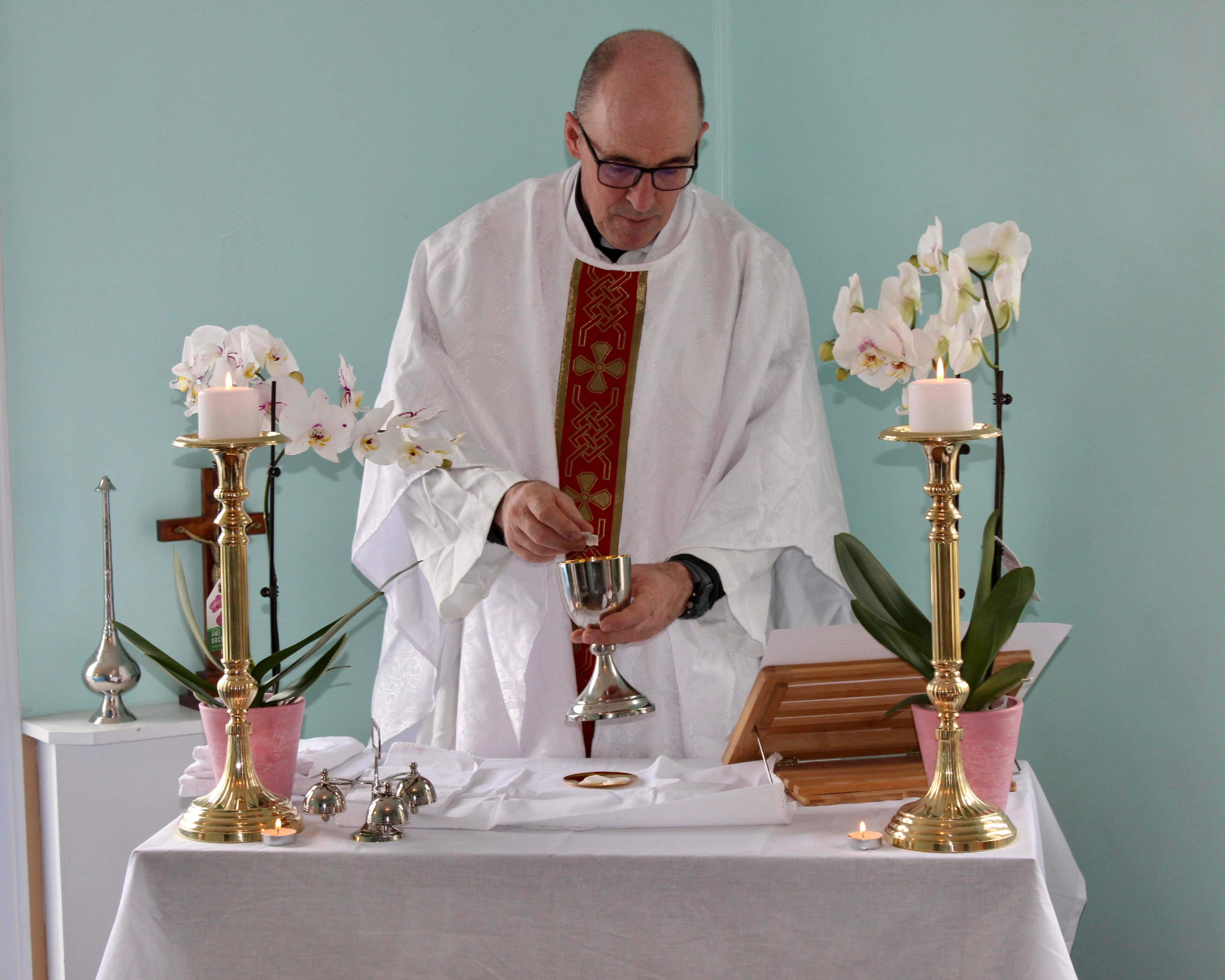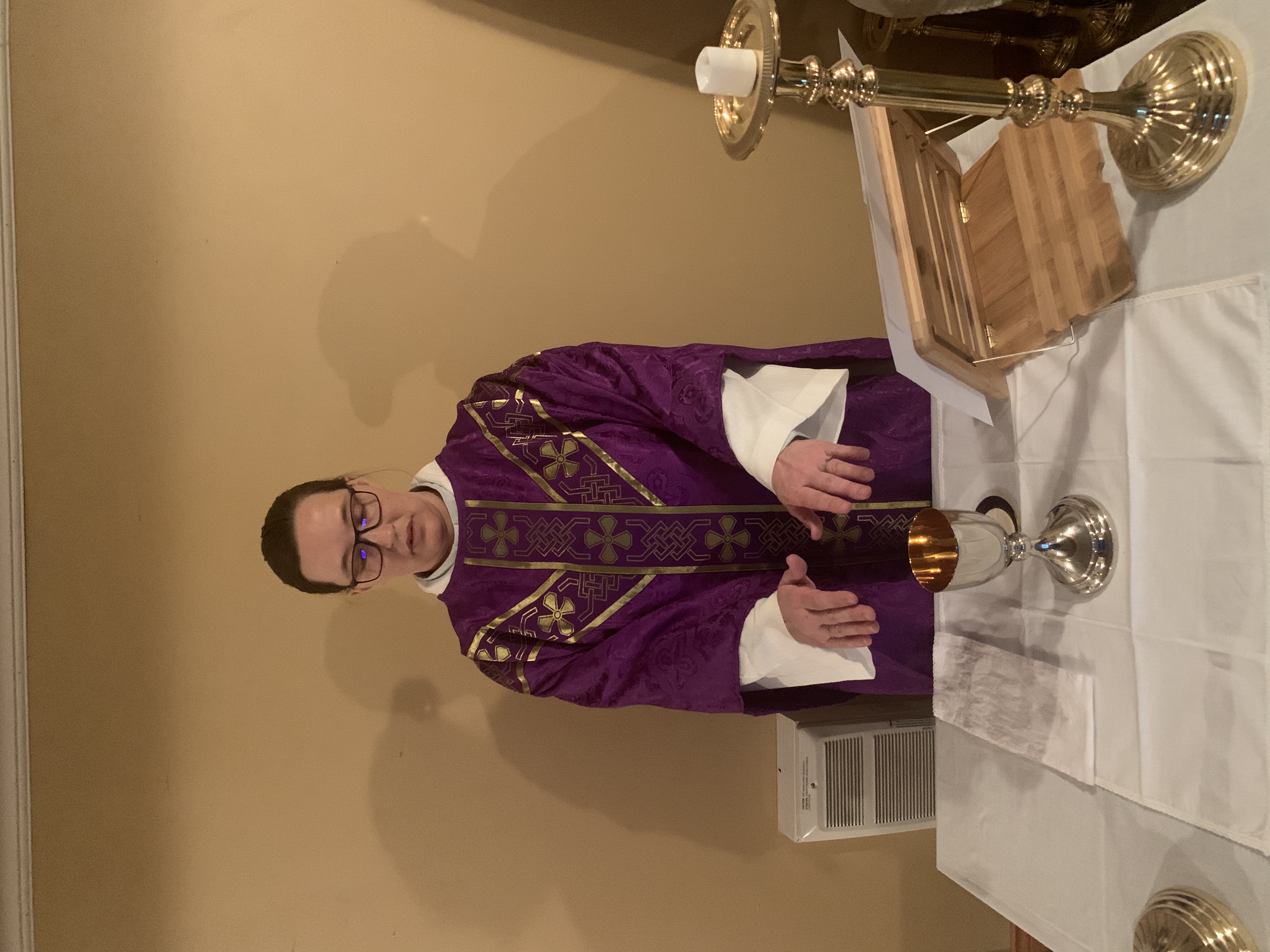- Home
- Other Catholics
- Catholics Or Community Catholics
Simply Catholic and Welcoming You
Catholics or Community Catholics

Archbishop Bradley , a Married Bishop Saying Mass. Note the Simplicity of the Altar Yet the Similarities of Altar and Vestments to Those of the Roman Catholics
Catholics or Community Catholics isn’t really a question, rather it is a simple comparison of differing branches of the same Catholic faith.
Roman Catholics, Old Catholics and Community Catholics share many core Christian beliefs, such as the Holy Trinity, sacraments, and the authority of the first seven ecumenical councils, but differ primarily in Old Catholic and therefore Community Catholic rejection of papal infallibility and a decentralized church structure versus Rome's central authority under the Pope. Old Catholics and Community Catholics also allow married and female clergy and conduct liturgy in the vernacular, while Roman Catholicism maintains a celibate clergy and traditionally used Latin although they too now use the vernacular.
Similarities
Trinity:
All three traditions believe in the Holy Trinity (God the Father, Son, and Holy Spirit).
Seven Sacraments:
All three recognize seven sacraments: baptism, confirmation, Eucharist, confession, marriage, holy orders, and anointing of the sick.
Shared History:
All three share a common historical past and the traditions established by the first eight centuries of the undivided Catholic Church and the first seven ecumenical councils.
Reverence for Mary:
Old Catholics and Community Catholics hold Mary in high esteem, referring to her as the Blessed Virgin Mary and believing in the Immaculate Conception and the Assumption.
Differences
Papal Authority:
The most significant difference is the Old Catholic/Community Catholic rejection of the Pope's absolute authority, particularly the doctrine of papal infallibility, which was a primary reason for the Old Catholic separation.
Church Structure:
Old Catholicism/Community Catholicism are decentralized church structures, with the Conference of Bishops holding ultimate authority, while Roman Catholicism has a hierarchical structure centered on the Pope and the Holy See.
Clergy:
Old Catholic and Community Catholic churches permit priests to marry and have ordained women as priests. In contrast, Roman Catholicism requires celibacy for its priests and does not ordain women.
Liturgy:
Old Catholics and Community Catholics use the vernacular (local language) for their liturgies, a practice that began after the Protestant Reformation, whereas Roman Catholicism traditionally used Latin although they too now use the vernacular.
Eucharistic Practice:
Old Catholics offer the Eucharist to all baptized Christians, not exclusively to other Catholics. The Roman/Latin Catholics offer the Eucharist exclusively to baptized Catholics in full communion with the Roman Church. Community Catholics also offer the Eucharist to not yet baptized youth, provided they can receive it respectfully up until they turn 12 years old.
Confession:
While Roman Catholicism requires confession to a priest, Old Catholic and Community Catholic confession is a private act and not mandatory before a clergy member. (It is available upon request.)
Ecumenism:
Old Catholics have been more open to ecumenical dialogue and have worked to develop relationships with other Christian denominations, while the Roman Catholic Church has been more cautious about such efforts. Community Catholics follow the example of their Old Catholic forebears.
Catholics or Community Catholics Shared Beliefs

Bishop Charlene Saying Mass - Married and Female Clergy are Fully Endorsed In Community Catholic Churches, a Major Difference from Our Roman Catholic Counterparts.
Despite their differences, Old Catholic and Community Catholic Churches share many fundamental beliefs with the Roman Catholic Church (Latin Rite of the Catholic Church):
Apostolic succession:
They maintain apostolic succession, meaning their bishops can trace their lineage back to the original apostles.
All three churches canons (laws) agree that each is equal in “Dignity and action”. This despite many catholic individuals erroneously insisting otherwise. Indeed even my own staunchly R.C. Irish mom used to announce that “if it’s not Roman Catholic, it’s not Catholic!” I have even seen Roman Catholic Cardinals on You Tube saying things such as 'I cannot refer to these other denominations as churches as there is only one true faith so I'll call them communities...' A statement made in complete opposition to the Roman Catholic Code of Canon Law! No wonder the general populace gets the wrong idea.
The Roman Catholic Code of Canon Law and similar canons in each of the other Catholic Rites are clear on the validity, Apostolic Succession and dignity of each of our sister churches.
THE OBLIGATIONS AND RIGHTS OF ALL THE CHRISTIAN FAITHFUL (Cann. 208 - 223)
Can. 208 From their rebirth in Christ, there exists among all the Christian faithful a true equality regarding dignity and action by which they all cooperate in the building up of the Body of Christ according to each one’s own condition and function.
Despite what some individuals choose to insist we are all part of the “One, holy, Catholic and Apostolic Church”. Currently we do stand divided by our differences yet we all pray for the day we stand joined as one entity before Christ and the world.
Sacraments:
All three traditions recognize the validity of the seven sacraments.
Creeds:
They accept the ancient creeds, such as the Nicene and Apostles' Creeds.
Early ecumenical councils:
All three adhere to the dogmatic decisions of the first seven ecumenical councils.
Community Catholics
Definition:
A broad and informal term for groups that identify as Catholic but are more open and inclusive. A term also specific to St. Brigit's Community Catholic Church and others who literally include the term in their registered names.
The Community Catholics draw from Old Catholic, Roman Catholic and Anglican traditions and are open to accepting other Catholic traditions, as appropriate moving forward.
Community Catholics have evolved originally from the Old Catholic Church.
Characteristics:
Emphasizes an affirming, Christ-centered communities where questions are welcome and spiritual journeys are honored.
Inclusivity:
Are inclusive of LGBTQ+ people and open to innovation in doctrinal development. Willingly ordain suitable candidates regardless of gender or gender preferences, marital status, sexual orientation or differing abilities (disabilities) to the priesthood and/or the episcopate.
Today, the Community Catholic Churches, including St. Brigit’s Community Catholic Church, like our forebears in the Old Catholic Church, continues to be catholic in belief, creedal, sacramental in worship, and free in structure. We carry forward the faith of the early Church — with open hearts, open theology, and a deep respect for conscience into our modern world.
Recent Articles
-
The Basic Catechism of the Catholic Church
Feb 12, 26 11:03 AM
A basic catechism of any rite or branch of the catholic church acts as a primary reference for teaching the faith -
The Divine Office
Feb 07, 26 11:07 AM
The Divine Office The Divine Office, also known as the Liturgy of the Hours or Opus Dei ("Work of God"), is the official, daily set of prayers of the Catholic Church -
Women Being Removed or Voided from Scriptures
Jan 17, 26 05:06 PM
The concept of women being "removed" or "voided" from scriptures refers to both the physical exclusion of female narratives in historical texts...
Boat Harbour West, Newfoundland, Canada. Cell Number 709-276-0626
Join Us Also on Our St. Brigit's Community Catholic Church Prayer group on Facebook: https://www.facebook.com/groups/324523956473448


